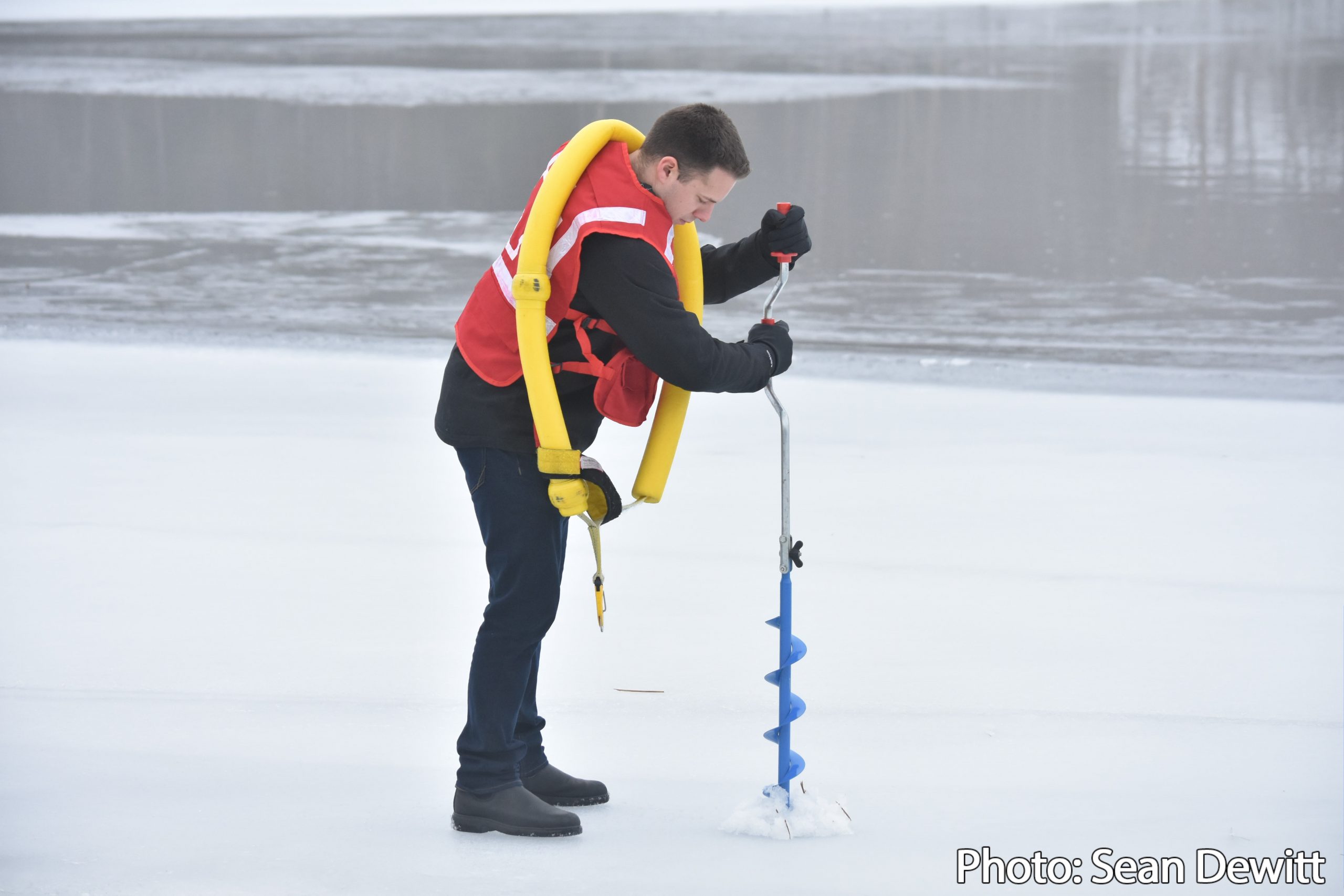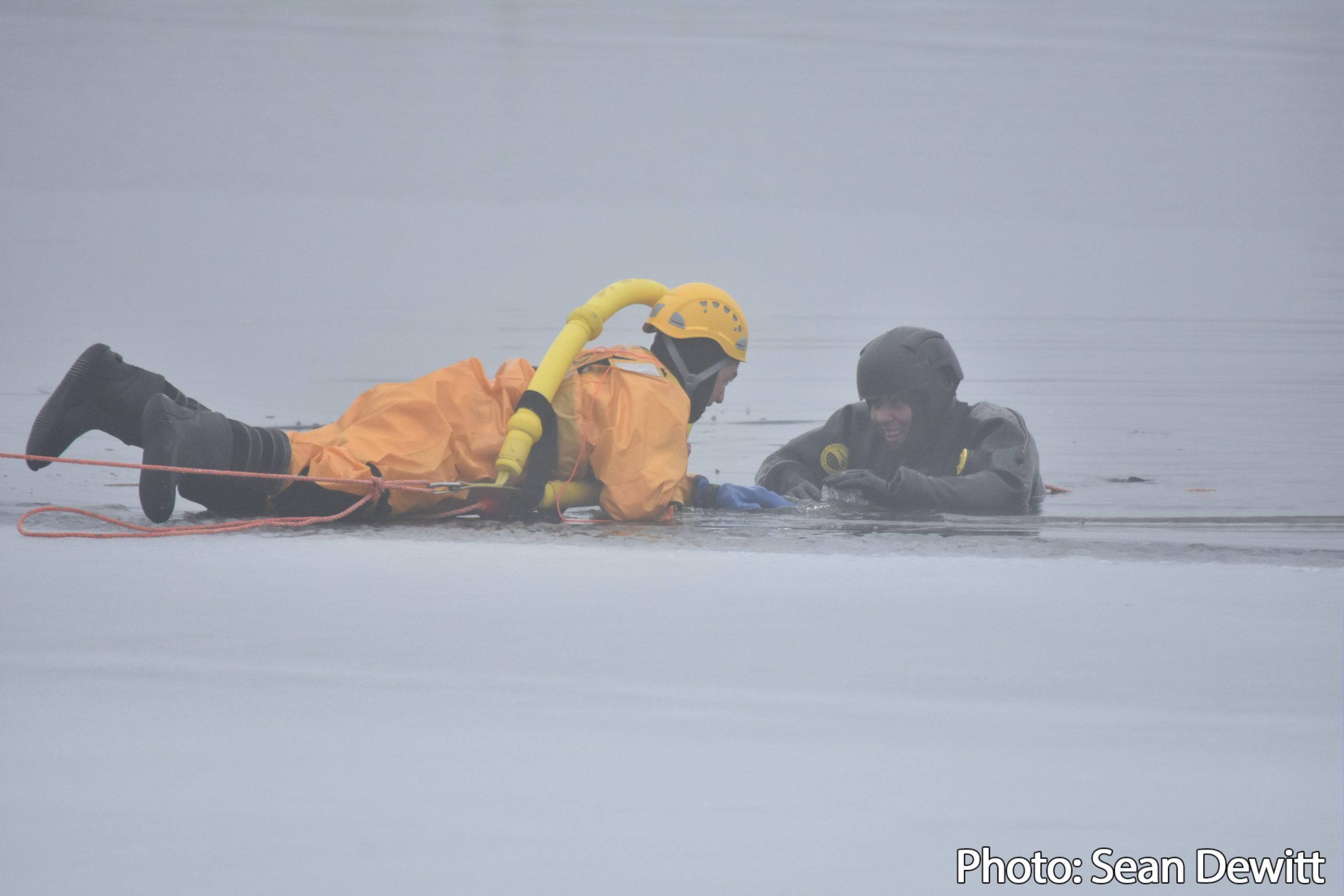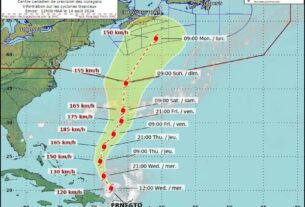**** Multi sourced (HRM, HRGE, RCMP, RED CROSS)
Ice safety saves lives: Multi-agency demo shows how fast action makes a difference

A multi-agency demonstration of ice safety and recovery today in Fall River to explain the importance of quick response on behalf of first responders and the victim in the event of an unexpected fall through the ice.

(Via HRFE)
Being able to self extracate from a fall through the ice makes a difference, but shock & fatigue, or a medical condition, can pose a serious risk. Fast reactions by trained responders plays a vital role in fast rescue.

Ice testing takes place on Lake Banook. Testing takes place in several areas on a body of water as ice conditions can vary based on many factors, such as current, depth and so on. Crews work in pairs, one on shore, and tied on for crew safety.

The following partners in public safety were on hand:
- Halifax Regional Municipality Transportation and Public Works – Demonstrating ice testing techniques
- Canadian Red Cross – Discussing recommendations for appropriate ice thickness
- Emergency Health Services paramedics – Discussing cold weather health tips
- Halifax Regional Fire & Emergency – Demonstrating enhanced ice rescue techniques
- Halifax Search and Rescue – Demonstrating self-rescue techniques
- Halifax Regional Police – Discussing what to do if you see someone fall through the ice
The above ice safety tips is from the Halifax Search and Rescue and HRM.

” Each winter, Nova Scotians dust off their snowmobiles, snowshoes, skis or skates for some fun in the snow. They often cross one of our province’s more than 3000 lakes or clear snow on an inlet to ice fish.”

Whatever your passion, it’s important to understand when it is safe to be on those frozen bodies of water and when it should be avoided. Naturally occurring ice is unpredictable. Never go on the ice alone!

(Via HRFE)
Make sure you have proper safety equipment with you at all times, and keep these tips in mind before you head out.

Ice Strength
Gauging the strength of ice is very difficult. There is no such thing as 100% safe ice.
- Never walk or drive on cloudy ice.
- Only go on clear, thick ice.
- Spring ice is NEVER safe.
- Ice thickness is never consistent: it will be flat on top, but not on the bottom.
- Snow on ice acts as an insulator: it makes ice warmer and weaker.
- Extreme cold snaps will weaken ice.
- Ice formed over running water (rivers and streams) is more dangerous than ice formed over standing water (lakes and ponds).
ICE THICKNESS
Each winter, the municipality regularly tests ice thickness at more than 80 lakes in the Halifax region, primarily in the urban core. Ice thickness reports for lakes tested by the municipality will be available to the public on a weekly basis, beginning in January.

Residents are urged to always assess each situation and its conditions before taking a step onto the ice of any lake or body of water.

(Via HRFE)
Ice thickness should be:
- 15 cm for walking or skating alone
- 20 cm for skating parties or games
- 25 cm for snowmobiles
Be safe. Avoid going out on ice at night and always check conditions before venturing out.

(Via HRFE)
Many factors affect ice thickness including:
- Water depth and size of body of water
- Currents, tides and other moving water
- Chemicals including salt
- Fluctuations in water levels
- Logs, rocks and docks absorbing heat from the sun
- Changing air temperature
- Shock waves from vehicles traveling on the ice
On the Ice: What to Bring

Taking the right gear is key to staying safe on the ice. Here are the essentials:
- Appropriate clothing: layers, waterproof jacket/pants, warm hat, gloves and socks
- Snowmobile floatation suit or life jacket/personal flotation device (PFD)
- Appropriate footwear (e.g., crampons to convert footwear for use on ice)
- Ice picks (stored in an accessible pocket where they will be easy to reach if needed)
- Throw rope—and know how to use it!
Self-Rescue & Rescuing Others

Make sure you know how to escape if you break through ice, and how to help someone escape a similar situation. If you break though:
- Do not panic. Your clothing will trap air and keep you buoyant.
- Turn towards the direction you came from and place your hands and arms flat on the unbroken surface.
- Kick your feet and try to push yourself up on top of the unbroken ice on your stomach, like a seal.
- Once you are lying on the ice, don’t stand up. Roll away from the break until you are on solid ice.
If someone else breaks through:
- Stay calm and think out a solution.
- Don’t run up to the hole. You might break through and then you’ll both need help.
- Use an item to throw or extend to your friend to pull them out of the water—if you don’t have a rope, improvise with items such as jumper cables, skis, etc.
- If you can’t rescue the person immediately, call 911 on a cell phone.
Drones have made a significant difference within the HRFE and teaming with other agencies. Quick deployment and a variety of cameras (FLIR etc) can help safely and accurately locate a victim who has fallen through the ice

For more safety tips on ice safety, please visit adventuresmart.ca.”
Video via HRFE:



